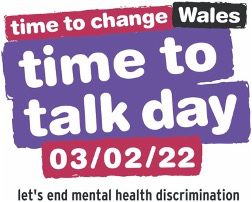Almost 1 in 3 respondents (31[i] per cent) to a survey of 1,000 over 16s in Wales who have experienced worsening of their mental health for the first time during the pandemic have yet to have a conversation about it – equivalent to around 50,000 people in Wales[ii] – according to research published today.
New figures released on Time to Talk Day also found that over 1 in 3 Welsh respondents (35 per cent) say their circle of friends and family has got smaller.
The survey was conducted on behalf of the mental health anti-stigma campaign Time to Change Wales, supported by Co-op, as part of Time to Talk Day, a national day to encourage conversations about mental health. The aim is to spark conversations about mental health in Wales through communities, schools, homes, workplaces and online.
Worryingly, the survey has also found that 33% of those who experienced a worsening in their mental health during the pandemic haven’t spoken to anyone about it say that it’s because everyone is struggling, and they are no different. The findings reinforce Time to Change Wales’ message of the importance to talk openly about mental health without judgement or feeling like a burden.
Dione Preece, 29, Time to Change Wales Champion from Bridgend, explains how difficult it was to lose touch with close friends and family at the start of the pandemic: “I was a single mother, and at the start of the pandemic my son was a newborn, so like many others, it was incredibly hard to juggle with being a first time mum and working full-time as the stresses of it all really took a toll on my mental health.
“Losing touch with close friends and family were particularly difficult for me as before the pandemic hit, we would often call each other and meet up but as soon as the COVID-19 restrictions were enforced, we lost face-to-face contact which also led to us no longer checking in with each other online. I didn’t want to reach out to anyone as I didn’t want to feel like a burden, and even when the pandemic restrictions started to ease, I had to self-isolate more often and strictly manage my social circle as I was working in the front line as an Activity Coordinator for children at my local hospital. I was also concerned for my son as he wasn’t around as many family members as I would have liked but he was still able to see his dad, and both sets of grandparents. I was just mainly worried that he wouldn’t be able to be around other children and make friends in this uncertain climate we’re in.
“Once my mental health started to get worse, I found myself not having the urge to contact anyone anymore, to the point where the thought of composing a text message became mentally draining for me, and as time went on, I spent a lot more time with children which made me feel more comfortable being in that environment than being around adults.”
This year’s Time to Talk Day emphasises listening as well as talking. Often people feel they don’t have anyone to turn to, so Time to Change Wales is encouraging each other to be a listening ear for someone who needs it.
Previous research by Co-op, Mind, SAMH and Inspire showed the vital role of community for mental wellbeing. One in four respondents (28 per cent) to the Together Through Tough Times[iii] survey said that non-judgemental spaces in the community where they could talk and listen to others would support their wellbeing. In addition to delivering Time to Talk Day 2022, Co-op colleagues, members and customers are raising £8m for Mind, SAMH and Inspire, which will fund more than 50 mental wellbeing services in communities across the UK, supporting over 10,000 people to improve their mental wellbeing.
Dione runs a family gym with her father and shares how she uses the space to encourage her community to talk more openly about mental health: “My father supports Caerau Men Shed opened by his friend Christopher at the gym, which is a safe space where men can come together and talk about how they are feeling without being judged. We also invite them to take up boxing sessions where my father takes the class, so that they get both emotional and physical support through our wellbeing activities.
“We also run parent and toddler classes twice a week which encourages parents to leave the house, bond with their toddler and get to know other parents who may be experiencing similar struggles as them.
“It’s now more important ever for communities to run social or physical activities if restrictions allow, so that people are encouraged to leave their homes and feel part of the community again. During this time, I was able to rebuild lost relationships and now have an amazing support system which includes my boyfriend and his friends and family.”
Encouragingly, of those who have talked to someone, research shows that more than two thirds (69%) report at least one positive conversation, with feeling supported (51%) and feeling listened (52%) to the major reasons why it was positive. Almost two thirds of all survey respondents (64%) agreed that overall, it’s getting easier to talk about mental health[iv].
June Jones, Interim Programme Manager for Time to Change Wales said: “Dione and her father are setting a great example of how community initiatives are important in reconnecting with familiar faces and providing safe havens to openly discuss our mental health. However, unfortunately stigma is still an issue with some people feeling uncomfortable talking to others about their mental health problems; even feeling ashamed and having concerns about being judged, and yet many people say it is a positive and helpful experience talking about their mental health as they feel more supported and less alone. This is why we are urging everyone to use Time to Talk Day as an opportunity to break down barriers and have real and meaningful conversations about mental health.”
Rebecca Birkbeck, Director of Community and Shared Value at the Co-op said: “It’s never been a more important time for us to be able to talk about how we are feeling, however, it can still be hard to speak up about our mental wellbeing. Our research has shown the vital role played by our communities in kickstarting these conversations, giving us the chance to open up whilst we are out and about. We know many people are still waiting for the right time to do that, so we’re encouraging everyone to give it a go this Time to Talk Day.”
Time to Talk Day 2022 is run by Time to Change Wales, Mind and Rethink Mental Illness in England, See Me with SAMH (Scottish Association for Mental Health) in Scotland and Inspire and Change Your Mind in Northern Ireland. It is also delivered in partnership with Co-op. The partners are supporting communities across the UK to encourage mental health conversations by providing free resources, including tips on how to have the conversation about mental health and running a UK-wide awareness campaign.
On Thursday 3 February, workplaces and individuals in Wales are set to take part in Time to Talk Day. In light of the current restrictions on our lives, many Time to Talk Day activities will be taking place virtually this year. For information on how to get involved in Time to Talk Day please visit: https://www.timetochangewales.org.uk/en/campaigns/timetotalkday/
Join in the conversation online using the hashtag #timetotalk on:
Twitter: www.twitter.com/TTCWales
Facebook: www.facebook.com/TTCWales
Instagram: www.instagram.com/timetochangewales
Help keep news FREE for our readers
Supporting your local community newspaper/online news outlet is crucial now more than ever. If you believe in independent journalism, then consider making a valuable contribution by making a one-time or monthly donation. We operate in rural areas where providing unbiased news can be challenging. Read More About Supporting The West Wales Chronicle
























